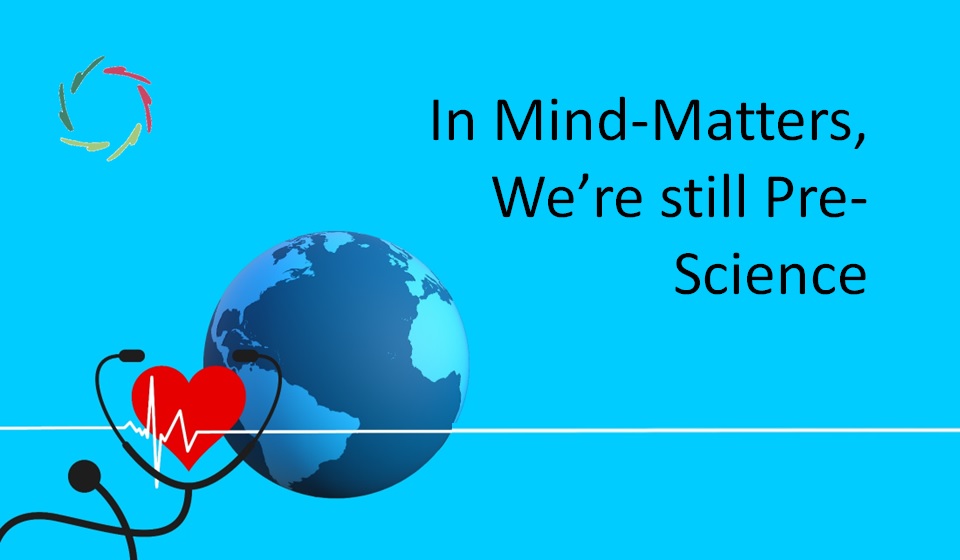In Mind-Matters, We’re still Pre-Science

Well, mostly. Unfortunately, as we were still pre-science in body-matters 250 years ago, we still are in mind-matters today.
In healthcare 250 years ago, practices like bloodletting, enemas, and the theory of four humors were prevalent. There was some science in that pre-science era, but it was pretty limited.
Note that in this blog, ‘mind’ encompasses both mind and heart, as ‘heart-matters’ primarily occur in the brain/mind.
Body science is the wrong science for mind-matters.
That’s because the mind’s fine-grained complexity resists being molded into operational categories stable enough for traditional scientific demands.
This is not an anti-scientific stance but a call for better science from the ground up, advocating for a deeper, more nuanced approach to mind-science.
The base level
This is the foundational level of elements necessary for scientific inquiry.
In body-matters, these elements are readily discernible through empirical observation and investigation. Western Enlightenment marked the rise of trust in this method, where empiricism largely replaced the authoritarianism previously dominant in ‘science.’
However, this mechanization’s success led people to attempt replicating it in mind-matters.
Many continue to investigate the mind as a machine with distinct elements, despite repeated failures. Examples include the reproducibility crisis in psychology, the dodo bird effect in psychotherapy, failures in treating psychosomatic disorders and drug abuse (e.g., opioid disaster), and the widespread blindness to the power of the placebo effect.
Stubbornly adhering to an ill-fitting idea is a form of authoritarianism. Contrary to this, recognizing the mind’s complexity could pave the way for more effective and integrative therapeutic approaches.
Of course, we must avoid falling into mind-authoritarianism.
In any case, the above statements are well-investigated empirically and can be considered factual.
As mentioned, this should not lead us into an anti-scientific mindset. So, how do we progress?
As you might guess, here comes A.I. to the rescue.
This is, present-day ‘subconceptual A.I.’ (this is: neural nets, transformers) as opposed to conceptual A.I. (expert systems, GOFAI).
However, the solution lies not in using A.I. with the old mindset but in allowing today’s A.I. to open doors to a new self-perspective. This view combines rationality AND depth, the elements of which are respectively conceptual and subconceptual. This blend of rationality and depth through A.I. can revolutionize our understanding of mental health, offering holistic solutions that integrate science and human experience.
An abyss and an opportunity
The abyss represents the human depth largely neglected in healthcare science. The negative side is that many people fall into this depth without receiving the help they need, often leading to adverse outcomes.
The opportunity lies in our ability to address this neglect. By harnessing the power of neural networks and transformers, we can analyze individual patterns of thought and emotion on a granular level. This will enable the creation of bespoke therapeutic interventions that resonate more deeply with each person’s unique mental landscape. Such precision in treatment can lead to more effective outcomes and a broader understanding of the human mind.
Beyond alleviating immense human suffering and achieving significant ethical gains, this approach can also boost the economy and material welfare tremendously, potentially in the trillions of euros.
Of course, Lisa can significantly help fill this gap.
I wonder how this will be viewed in 250 years.
Or even in 25 or sooner.
―
Addendum
Me: “Lisa, from all your background knowledge, can you add an original idea to this?”
Lisa: “Here’s an additional idea: By incorporating A.I., we can also develop advanced simulations of mental processes. These simulations can serve as training tools for mental health professionals, providing them with deeper insights into the subconscious workings of the mind. Such simulations could help therapists practice and refine their approaches in a controlled environment, leading to more effective real-world applications and fostering a more profound understanding of mental health dynamics.
I wonder how this will be viewed in 250 years. Or even in 25 or sooner.”


